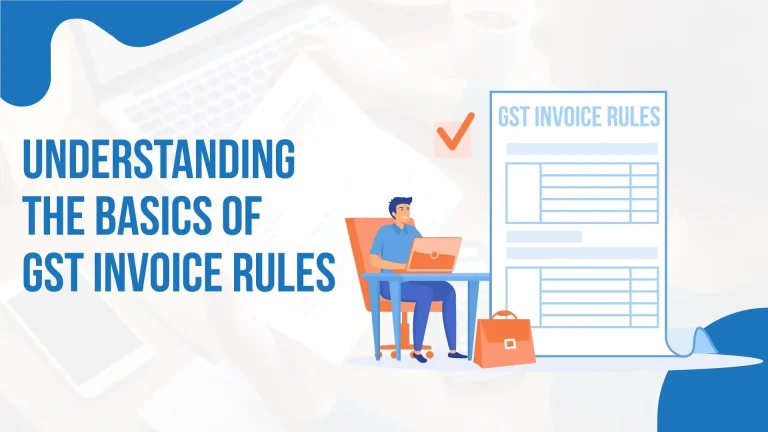In India, when we talk about taxes, we can’t miss out on the Goods and Services Tax (GST). It’s been in place since 2017 and has changed how we deal with taxes on goods and services. One important aspect of GST is the rules about invoices. These rules are like guidelines that tell us how to make and use invoices. In this guide, we’ll talk about the basic stuff you need to know about GST invoice rules.
Importance of GST Invoice Rules
Think of GST invoice rules as the backbone of the GST system. They help make sure everything related to taxes is transparent and easy to understand. By following these rules, we can stop people from avoiding taxes, make sure businesses are legal, and make it easier for them to get tax credits. So, knowing and following these rules is really important for any business.
What are the GST Invoice Rules?
The GST (Goods and Services Tax) invoice rules lay down the guidelines and requirements for issuing invoices under the GST regime in India. These rules are essential for businesses to follow to ensure compliance with the law and facilitate seamless tax administration. Here are some key aspects of the GST invoice rules:
- Mandatory Invoice Issuance: Every registered person under GST is required to issue a tax invoice for the supply of goods or services. This applies to all taxable supplies, except in cases where the GST law provides for specific exceptions or alternative documents such as bill of supply.
- Invoice Format: The GST law specifies the format of the tax invoice and the information that must be included in it. This includes details such as the supplier’s name, address, GSTIN (Goods and Services Tax Identification Number), the recipient’s name, address, GSTIN (if registered), invoice number, date of issue, description of goods or services, quantity, value, tax rates, and amount of tax charged.
- Different Types of Invoices: Depending on the nature of the transaction, different types of invoices may be required. For example, a tax invoice is issued for taxable supplies, while a bill of supply is used for exempt supplies or for businesses opting for composition scheme. Export invoices are used for goods or services exported out of India.
- Time of Issuance: Invoices must generally be issued at the time of supply of goods or services or before or after the supply as specified in the GST law. The timing of issuance may vary based on the type of supply and other factors.
- Invoice Corrections and Amendments: In case of any errors or omissions in the invoice, provisions are made under the GST law for correcting or amending invoices within a specified time period and in accordance with prescribed procedures.
- Retention and Maintenance of Records: Businesses are required to maintain proper records of all invoices issued and received, along with other relevant documents, for a specified period as per GST regulations. These records serve as the basis for claiming input tax credit and for compliance with GST audits.
- Penalties for Non-Compliance: Failure to comply with GST invoice rules may result in penalties and adverse consequences, including denial of input tax credit, interest on tax dues, and other enforcement actions by tax authorities.
- E-invoicing: The government has introduced e-invoicing as a measure to enhance compliance and simplify the invoicing process under GST. E-invoicing involves the generation of invoices in a standardized electronic format, which are then authenticated and registered on the GST portal. This system aims to reduce errors, enhance transparency, and facilitate real-time tracking of invoices.
- Input Tax Credit (ITC): Compliance with GST invoice rules is vital for businesses to claim input tax credit on their purchases. To avail ITC, businesses must ensure that the invoices they receive from suppliers comply with the prescribed format and contain all the necessary details as per GST law. Any discrepancies or non-compliance in supplier invoices can lead to challenges in claiming ITC, affecting the business’s cash flow and profitability.
- Changes and Updates: The GST invoice rules are subject to changes and updates by the government from time to time. Businesses need to stay informed about any amendments or notifications issued by the GST council or tax authorities regarding invoicing requirements. Keeping abreast of changes ensures that businesses can adapt their invoicing practices accordingly and avoid non-compliance issues.
- Integration with Accounting Systems: Many businesses integrate their invoicing processes with their accounting systems to streamline operations and ensure accuracy in financial reporting. By automating the generation and recording of invoices, businesses can minimize manual errors, improve efficiency, and maintain compliance with GST regulations.
- Cross-border Transactions: For businesses involved in cross-border transactions, compliance with GST invoice rules becomes even more critical. Export invoices must comply with specific requirements laid down by the GST law, including documentation for claiming export benefits and compliance with international trade regulations.
Legal Framework and Requirements
The GST law has specific rules about how invoices should look and what information they should have. According to these rules, anyone who’s registered for GST has to give an invoice for every sale they make, unless there are special cases where they don’t need to. The invoice needs to have details like the seller’s and buyer’s names, addresses, and GST numbers, along with the date, description of what’s being sold, quantity, price, and the amount of tax. Different types of sales need different kinds of invoices, like regular sales, sales where no tax is involved, or sales to other countries.
Invoice Format and Compliance
To follow GST invoice rules, businesses need to make sure their invoices look right and have all the needed information. If they don’t, they could get in trouble and have to pay fines. It’s also important to keep good records of all the invoices they give and receive. This helps them claim tax credits and check if they’ve paid the right amount of tax.
Challenges and Common Mistakes
Even though the rules are there, sometimes businesses make mistakes with their invoices. They might forget to put in all the details, get things wrong, or not follow the timing rules. These mistakes can cause problems later, like delays in getting money back from taxes or arguments with tax officials. So, it’s really important for businesses to be careful with their invoicing.
Best Practices and Recommendations
To avoid problems with invoicing, businesses can do a few things. They can use computer programs to make sure their invoices are correct, do regular checks to catch any mistakes, train their staff on how to make invoices right, use technology to help with invoicing and checking, and get advice from experts when they’re not sure about something. By doing these things, they can make invoicing easier and avoid problems with taxes.
Keeping Up with Changes
The world of taxes is always changing, and GST is no exception. As time goes on, the rules about invoices might change too. That’s why it’s important for businesses to keep an eye on any updates or new rules that come out. This way, they can make sure they’re always doing things the right way and staying out of trouble with the tax authorities.
Leveraging Technology
Technology can be a huge help when it comes to invoicing and staying compliant with GST rules. There are lots of software programs and apps out there that can make invoicing easier and less prone to mistakes. Some of these programs can even automatically generate invoices and keep track of all the necessary details. By using technology like this, businesses can save time and reduce the risk of errors in their invoicing process.
Training and Education
Another important aspect of staying compliant with GST invoice rules is making sure that everyone in the business understands what they need to do. This means providing training and education to staff members about the importance of invoicing correctly and the consequences of getting it wrong. By investing in training, businesses can ensure that everyone is on the same page when it comes to invoicing practices and compliance with GST rules.
Seeking Professional Advice
Sometimes, the rules about GST invoices can be complicated, and it’s not always easy to know what to do. In these cases, businesses shouldn’t hesitate to seek professional advice. Tax consultants and accountants who specialize in GST can provide valuable guidance and assistance in navigating the complexities of GST invoicing. By consulting with experts, businesses can ensure that they are following the rules correctly and minimizing the risk of non-compliance.
Adhering to GST invoice rules is crucial for businesses operating in India. By following the prescribed formats, maintaining accurate records, and leveraging technology and professional expertise, businesses can streamline their invoicing processes, minimize errors, and ensure compliance with GST regulations. As GST continues to evolve and new challenges arise, staying informed, embracing technology, and seeking professional advice will be essential for businesses to navigate the ever-changing landscape of GST invoicing effectively.
Also Read:
- Why Would a Business Need to Cancel GST Registration?Goods and Services Tax (GST) has streamlined indirect taxation and brought about a unified system across the country. But while registering under GST is mandatory for many businesses, there may come a time when cancelling GST registration becomes not just… Read more: Why Would a Business Need to Cancel GST Registration?
- Why Should You Use Software for Your Annual GST Return?The annual GST return demands attention because filing it proves challenging. Does the procedure appear complicated together with being time-intensive? If so, you’re not alone! Companies encounter annual problems when they try to bring together their GST data for compliance… Read more: Why Should You Use Software for Your Annual GST Return?
- Why Is Timely GST Payment Important for Your Business?As the backbone of India’s taxation system, Goods and Services Tax (GST) plays a pivotal role in simplifying the business environment. However, it also brings with it a host of compliance requirements that businesses must navigate. Among these, timely GST… Read more: Why Is Timely GST Payment Important for Your Business?
- Why Is the Registration Process in GST Important for Businesses?The registration process in GST is not just a statutory obligation for businesses in India – it’s a crucial step that sets the foundation for seamless business operations, tax compliance, and overall growth. Whether you’re a budding entrepreneur or a… Read more: Why Is the Registration Process in GST Important for Businesses?
Frequently Asked Questions
Who needs to issue GST invoices?
Any business registered under GST needs to issue invoices for taxable supplies of goods or services. This includes manufacturers, retailers, service providers, and traders.
What information should be included in a GST invoice?
A GST invoice should include details like the supplier’s name, address, GSTIN, recipient’s details, invoice number, date, description of goods/services, quantity, value, tax rates, and amount of tax charged.
Can I use a regular invoice instead of a GST invoice?
No, under the GST regime, businesses must issue GST-compliant invoices for all taxable supplies. Regular invoices may not contain all the required information, leading to non-compliance.
What happens if I don’t issue GST invoices?
Failure to issue GST invoices can lead to penalties and compliance issues. It may also affect the recipient’s ability to claim input tax credit, causing financial implications for both parties.
Are there different types of GST invoices?
Yes, there are different types of GST invoices, including tax invoices, bill of supply, and export invoices. Each type is used for specific types of transactions and has its own set of requirements.
Can I amend a GST invoice after it’s issued?
Yes, you can amend a GST invoice to correct errors or update information. However, there are specific rules and time limits for making amendments, and it’s essential to follow them to maintain compliance.
Do I need to keep records of GST invoices?
Yes, businesses are required to maintain records of all GST invoices issued and received for a specified period. These records serve as evidence of transactions and are necessary for tax audits and compliance.
What is e-invoicing under GST?
E-invoicing is the electronic generation and authentication of invoices in a standardized format. It aims to improve compliance, reduce errors, and facilitate seamless data exchange between businesses and tax authorities.
Where can I find more information about GST invoice rules?
You can refer to official GST websites, publications, or consult with tax experts for detailed guidance on GST invoice rules. It’s essential to stay informed and updated on any changes or updates in the regulations.








